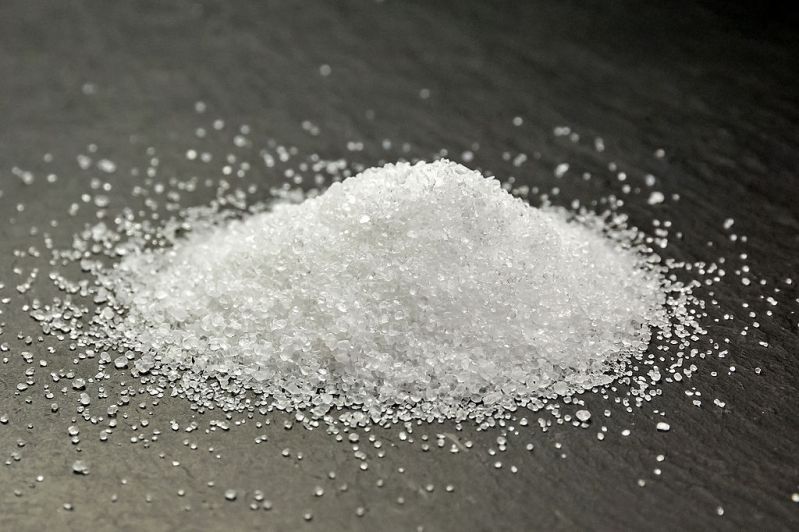While sugar substitutes have been around for more than a century, they didn’t really become mainstream here in the U.S. until around the mid-70s. According to Carolyn De La Pena, professor of American Studies at UC Davis and author of Empty Pleasures: The Story of Artificial Sweeteners from Saccharin to Splenda, between 1975 and 1984, Americans increased their consumption of artificial sweeteners by 150%. This timeline makes sense when you take into account that the late seventies coincided with the start of our crazed diet culture and the revolving door of fad diets.
One such diet that doesn’t seem to be going anywhere, however, is the keto diet. Still hugely popular among Americans trying to shed a few pounds, keto focuses heavily on limited or no carbohydrates. Because sugar contains carbohydrates, followers of keto have turned to artificial sweeteners to satisfy those late-night cravings — sweeteners that, more often than not, contain erythritol. Erythritol, in particular, has become hugely popular because it’s much better for baking than other sugar substitutes, has less of an artificial flavor, and will keep the eater in ketosis, which is key for losing weight on the keto diet.
A new study has made waves recently because its findings indicate there’s a link between erythritol and higher rates of heart attack and stroke (though the study did note that only an association was found — not causation. So should you be worried?
We asked Dan LeMoine, board-certified holistic nutritionist, the award-winning author of Fear No Food and the clinical director at Phoenix-based Re:vitalize Nutrition, what he had to say about erythritol, including its benefits and potential health risks. “Artificial sweeteners are still sweeteners. While many are non-nutritive or zero-calorie, we tend to view them similarly as we do regular sweeteners or sugars — moderation is key. While many have amazing implications on weight loss — being low to no-calorie options and having little impact on blood sugar, some have their downside,” he said.

Is there a cause for concern with sugar substitution?
While some of that sugar substitution has been good for waistlines and health issues that come from obesity, it seems to be causing more and more concern when it comes to other potential health issues. “For example,” said LeMoine, “some research indicates the popular sweeteners stevia may have negative effects on the gut microbiome. And the recent study showing a correlation between the sugar alcohol, erythritol, and heart attack and stroke.”
As with most things, moderation is the key to a healthy lifestyle. “If you’re an ‘every once in a while’ enjoyer of erythritol and have no underlying conditions, then you’re likely okay to continue using erythritol to satiate your sweet tooth from time to time,” LeMoine added. “If on the other hand, you have a history of blood clots or stroke, and are using erythritol daily, it might not be a bad idea to find an alternative as the study pointed to an increase in potential clotting risk among those who had high amounts of erythritol in their blood.”
Of course, cravings are often our body’s way of telling us that we’re lacking a particular mineral or micronutrient. When we find ourselves wanting sugar, that can mean our body needs micronutrients like chromium, tryptophan, or phosphorus. Of course, those can be found in natural ingredients like fatty fish, eggs, sweet potatoes, broccoli, or grapes. If we’re regularly eating a well-balanced, nutrient-rich diet, frequent sugar cravings should subside.

What are some foods that have erythritol?
Erythritol is naturally found in some fruits and vegetables, such as grapes, peaches, pears, and watermelon. It’s also found in mushrooms and fermented foods like beer, cheese, sake, soy sauce, and wine. In addition to whole foods, erythritol is commercially produced for use in a variety of processed foods, including:
- Sugar-free candy and gum
- Sugar-free ice cream and yogurt
- Sugar-free baked goods
- Sugar-free drinks and beverages
- Tabletop sweetener packets
Are there side effects to consuming keto foods with erythritol
In addition to what LeMoine has told us about consuming too much erythritol, there are some general side effects to be aware of, and the most common side effects are digestive problems, such as bloating, gas, and diarrhea. These side effects are typically mild and go away on their own. However, some people may experience more severe digestive problems, such as nausea, vomiting, and stomach cramps. Erythritol may also interact with certain medications, such as blood thinners and diabetes medications. If you’re taking any medications, it’s important to talk to your doctor before consuming erythritol.
At the end of the day, though, we’re human, and the desire for luscious, delicious, sugary sweet treats is real — especially when sticking to a stricter diet like keto. LeMoine wisely advised, “When it comes to sweeteners of any kind (artificial or not), our party line tends to be: ‘Treat treats like treats.'” Meaning, of course, that it’s perfectly fine to indulge every once in a while, but for the most part, kick those sugar cravings with a trip to the fruit bowl, not the candy, or, in this case, the “sugar-free” aisle.




